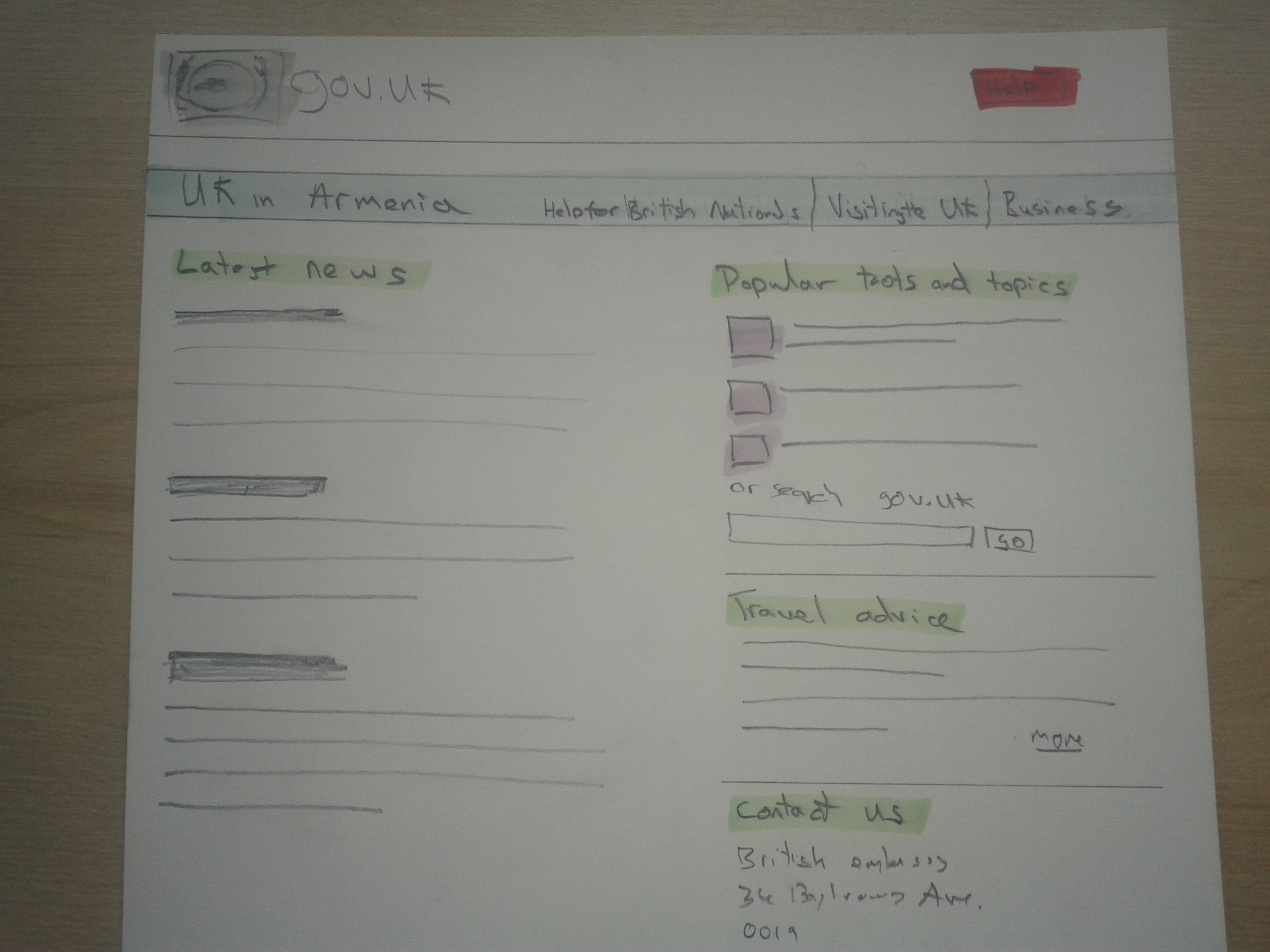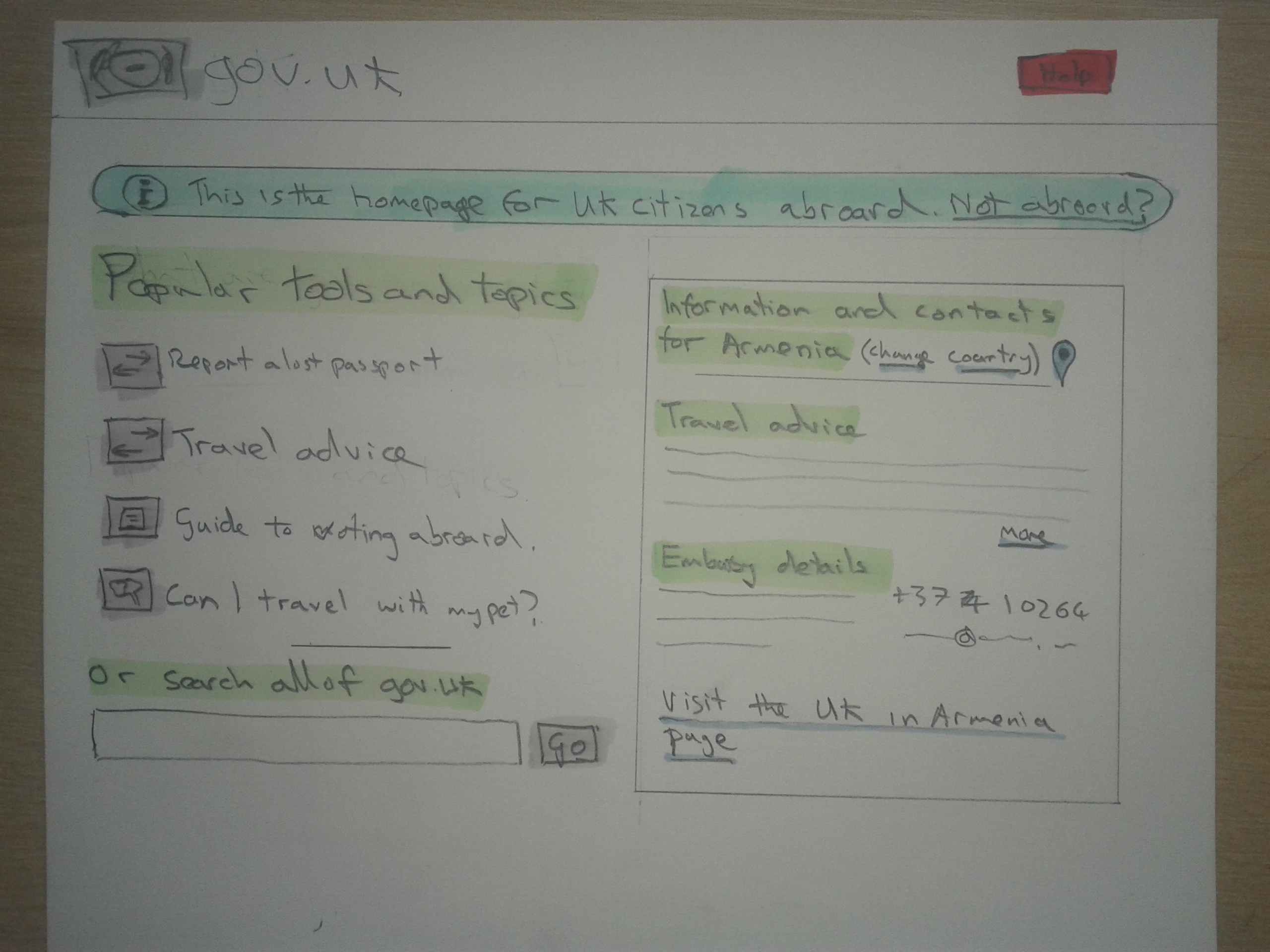One of the problems that Alphagov is trying to solve is the confusion generated by the fragmented nature of the government’s digital offering. Who’s in charge of what? Those who work in or around government too often work on the assumption that everyone knows who is responsible for what, but in reality, it’s quite a confusing picture. At a service level, DirectGov attempted to solve it, but (from where I sat), I’m not quite sure it ever worked.
So if it’s confusing for UK citizens, how much worse is it for those overseas who have occasion to interact with the UK government? They might be ex-pats, British travellers and tourists or they might be citizens of another country looking to visit, trade with or simply understand the UK. And Alphagov needs to work for them too.
The issues of branding and devolved editing comes into play here (those links are to my interpretations of these issues, not formal Alphagov suggestions) – and suggest some basic rules:
- That people overseas are even less bothered about which department they are dealing with than those inside the UK – they just want to deal with the UK government
- That the glue that holds together the content emanating from a devolved editing system is tagging.
- That the IP location tool that Alphagov has been using will be rather useful
So what that means is that a user heading to gov.uk in, say, India, will be sent to the India version of that page – gov.uk/India, automatically. IP recognition isn’t as exact a science as we would all like, but users would be given the option to change their location or to go to the UK version.
On that page, there would be a number of static links, largely decided by the data – what the user traffic tells us we need to show. These could be passports, visas, travel advice, contact information – by definition, nothing surprising.
The ‘fluid’ content would be created by editorial staff across government where their department has an interest in India – that could be the FCO, UKTI, DfID – or any government department or agency which works in or with that country. If they produce relevant content, it is tagged to both the department that produced the work and the country itself, so in this example it would be tagged to India. The discipline of tagging is important – from what defines ‘relevant’ content to a shared dictionary of how we refer to a country and whether we recognise a country or not.
So the gov.uk/india page becomes, in part, an aggregation of the content using that country name as a tag. It’s a semi-automated process – it’s a page which could be created on the fly but where the editorial control comes in is in the prioritisation of the stories. I’d suggest that, in practical terms, we would need to suggest a lead department for each country, and that lead would depend on policy priorities – are they diplomatic, trade-related, development-led? Some horse-trading would be likely (but there’s lots of areas of a single domain where that’s true). That editorial lead would decide what stories are highlighted on a front page or a carousel for that country, but all stories would share the same ‘home’, as decided by the tags. The departments creating each piece of content would be responsible, as now, for the distribution of that content and making sure it is seen by the right audience. That distribution is the key to the usefulness of the content – getting hung up about the role of the India page wouldn’t be the best use of our time – and, say, a news item or video is still more likely to be found through search, recommendation and social media. Departmental teams will remain responsible for the language used (and its search friendliness) and the distribution mechanics.
There’s more joined-up working envisaged in this model and, early on, the duplication of content and battles over fiefdoms will be apparent – but in the long run, having such problems surfaced will be healthier as overseas-facing departments become clearer as to who delivers what in terms of our delivery and reputation overseas.

Richard’s sketches illustrate something of how this could look, but it is to be hoped that as Alphagov becomes Betagov, this will be worked through and a more coherent view will become clear as the vague outline above becomes real and any genuine problems and clashes confronted. We need to have the conversations early though – this is my take, so we’d welcome the thoughts of others, inside and outside of government.



13 comments
Comment by Ed Hobart posted on
Jimmy,
We tried to do this in a cross (overseas arms of) Government effort in 2002 with i-UK. That was of course based on less developed and more cumbersome technology and based a bit more on the theory (never used in practice) that an Autonomy engine would aggregate content and serve it up to relevant users. So basically I like the concept, but I do think that it will need a bit more editorial input to get the structure right than some might hope for.
IP recognition is a good idea, but it wouldn't work for a key audience of organisations who have IP addresses in centrally defined ranges (eg the FCO!). Selecting where you are is fine (and quite normal), but would it look a bit wierd for the majority of customers who are based in the UK?
Ed
Comment by Will Stengel posted on
Not convinced about having a lead department for any given country. It's very tricky for a lead dept to think about the holistic customer perspective, as against what the dept may have for a customer. Directgov franchises faced the same problem. Giving somebody responsibility for taking the holistic view seems stronger. If that is the same as having a lead dept, fine. But taking a holistic customer view from within a department requires really strong support.
Comment by Alex posted on
Jimmy
Living in Scotland, Wales or NI can feel like being outside the UK depending on the transaction. Devolved and reserved powers throw up a host of issues with tiers of complexity.
Will there be alphagov, directgov, localdirectgov, scotgov, walesgov......etc
Are the alphagov team talking with the devolved administrations ?
Thanks
Comment by jimmyleach posted on
Paul
It's tricky to depend on location-based information for people who want information based on two different locations. If the full version switches neatly from overseas to UK then it oughtn't to be a big problem - but the search option will likely be most people's default. I don't think anyone's thinking of automated translation yet - translating pages into different languages (for UK and domestic audiences) is a future challenge.
Comment by PaulGeraghty posted on
There are a vast amount of second homers and buy-to-letters who are UK citizens and yet spend much of their time out of the country.
These people will know their uk postcode and expect to do the usual transactions in a familiar framework (pay council tax, pay car tax etc).
I acknowledge your comments about users being able to override IP-based settings "Show me UK version" and so on yet IP-based data still has a place and a relevancy.
OK I am coming in to Alpha.gov.uk to conduct a transaction as a Brit Citizen, but that local info you are piping me about health/travel warnings for the country I am in, well that is relevant to me too. It should not just vanish.
It might be tricky to pull off, but dont throw out the "local to me data" just because I say 'Show me the UK version'.
(Oh, and pleeeeeease - no google translate buttons)
Comment by Ann Priestley posted on
As an expat who recently needed to renew her passport I can confirm that some improvements are desirable!
Not all the issues I encountered were entirely website related - for example, the application was dealt with by a third country, neither the one I live in nor the UK, which meant I was required to visit three separate sites in order to gather the information I required, plus register for a payline to clarify an issue covered by none of them. I went round in circles several times and was left confused.
I am a web professional who worked for several years in a number of government departments - I hate to think how more 'normal' people would get on.
Renewing a passport must be a Top Task for expats, and I'm not sure tagging is the answer!
Comment by jimmyleach posted on
Tagging isn't the answer. It's a way to tie relevant and related content together, but that content still has to do its job. All sorts of transactions, passports included, need to be looked at again, in my view. One take on the passport issue was here:
http://alpha.gov.uk/report-lost-passport/
But plenty needs to be done.
Comment by Julia Chandler posted on
Good to see the alpha team is looking at this. DFID has a strong interest in helping UK people find out easily what the money being spent in developing coutnries is achieving, and I look forward to working with you all to explore how country information might be presented. Perhaps we could put some flesh on those skeleton models and use some real life examples?
Comment by jimmyleach posted on
Julia
It looks like I'm ignoring you, but we've discussed this separately...
Comment by Robin Brown posted on
I've got quite a few thoughts about this which I'll post later but a quick question. If I'm in India how would the overall UK government web presence going to look? Am I still going to be able to see the high commission web page or departmental home pages?
Comment by jimmyleach posted on
My own view is that this would replace Embassy or consulate pages, but would contain the information they currently have (contact points, commonly used services, the work of the post etc. On departmental pages, I had my say here:
http://tinyurl.com/3ghosge
Comment by Robin Brown posted on
I've posted some thoughts at http://wp.me/pTmxI-dU. I come at things from a public diplomacy/strategic communication perspective so the question I would ask is to what extent does the service delivery orientation positively or negatively effect communication/engagement activities? I'm more sceptical about the prospects for cross departmental working....
Comment by jimmyleach posted on
Robin
In your post, you seem to be saying that this would surface contradictory messages from different departments. That might be a painful process for departments to go through, but to flush out these instances would be healthy, in the long run, so that contradictions in statements or policy can be made visible and therefore resolved. Better than than hidden and unresolved, surely?